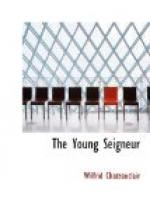The Bonhomme cried excitedly,—“It’s false!” His wife joined him with a wild scream of disappointment. A murmuring ran about. “Silence!” shouted the constable.
Every one involuntarily obeyed; and Chrysler absorbed himself examining the articles taken from the prisoner’s person.
The evidence was as soon disposed of as Libergent could have wished. Josephte gave her testimony to the appearance and surroundings of the injured man as she had found him. She could relate no circumstances that pointed to Spoon. The Bonhomme eagerly proffered his evidence. It was torn to tatters by the advocate: he had nothing to tell but rambling suspicions, and was told to stand down. It was discovered that none in fact had anything pertinent to say. Benoit was mad; Francois, unconscious; and Libergent triumphantly asked for the prisoner’s immediate discharge.
The great doubt on the part of justice was, clearly, why did the prisoner disappear? But this was quickly resolved by witnesses who swore that Cuiller was entrusted with secret political business which necessitated absences and journeys in different parts of the country, and this, in the state of political affairs, was an obvious enough excuse.
Libergent pressed once again for the discharge.
“I must grant it,” simply pronounced Mr. Genest.
Another scream pierced their ears. “Justice, oh God;” the old wife of Le Brun shrieked in trembling syllables. “They kill without hanging. I demand JUSTICE! Hear me, great God!” and her bent frame and wrinkled face writhed pitiably.
But it was done. Spoon descended with a sudden, wild grin and found himself free. “In a few hours,” he probably thought obscurely, “I can be far on my road.”
“Pardon me,” said Chrysler, however, standing up, to the surprise of everybody. “Your Honor, I have another charge to bring against the prisoner, and I ask his re-arrest.”
The Honorable made a sign to the constable to stay Cuiller.
“These bills,” Chrysler said, holding out the bank notes which were found in the purse of Spoon, “are marked with the initials of Francois Le Brun’s name. I am ready to charge the prisoner with having committed a larceny of money from Francois Le Brun on his journey from Montreal. I sustain it by these initials at the corners of bills just found on the prisoner’s person. I am informed—”
“I object, your Honor,” fairly shouted Libergent—“I object to any hearsay.”
“What can you swear to of your own knowledge?” asked l’Honorable of Chrysler, gently.
“To seeing these marks—”
“Which might be anything!” snapped Libergent.
“To hearing—”
“No hearsay, sir!”
“To having a conviction—”
“Upon no grounds whatever!—Your Honor, I press my just application for an immediate discharge.”
“I cannot see that there is yet evidence enough,” l’Honorable said courteously. “There are two charges, but both of them seem founded on vague suspicions which I cannot consider sufficient to detain the prisoner.”




